 Petzlover
Petzlover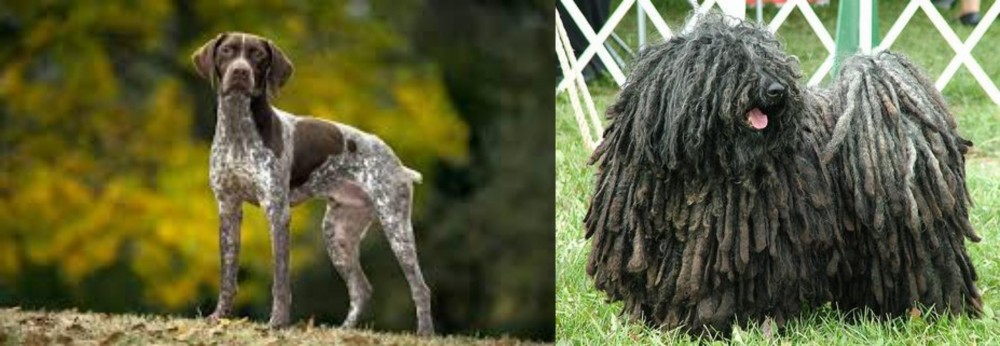 Braque Francais (Gascogne Type) is originated from France but Puli is originated from Hungary. Braque Francais (Gascogne Type) may grow 24 cm / 10 inches higher than Puli. Braque Francais (Gascogne Type) may weigh 19 kg / 42 pounds more than Puli. Both Braque Francais (Gascogne Type) and Puli has same life span. Braque Francais (Gascogne Type) may have more litter size than Puli. Braque Francais (Gascogne Type) requires Low Maintenance. But Puli requires High Maintenance
Braque Francais (Gascogne Type) is originated from France but Puli is originated from Hungary. Braque Francais (Gascogne Type) may grow 24 cm / 10 inches higher than Puli. Braque Francais (Gascogne Type) may weigh 19 kg / 42 pounds more than Puli. Both Braque Francais (Gascogne Type) and Puli has same life span. Braque Francais (Gascogne Type) may have more litter size than Puli. Braque Francais (Gascogne Type) requires Low Maintenance. But Puli requires High Maintenance
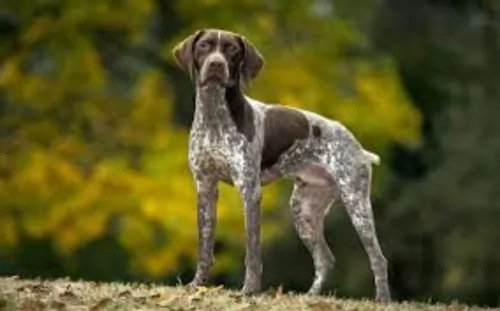 The Braques Français – Gascogne – is a hunting dog from southern France’s Gascony region. Known also as the French Gascony Pointer, this dog has descended from Spanish and Italian Pointers. The dog was saved from extinction at the turn of the 20th century.
The Braques Français – Gascogne – is a hunting dog from southern France’s Gascony region. Known also as the French Gascony Pointer, this dog has descended from Spanish and Italian Pointers. The dog was saved from extinction at the turn of the 20th century.
There are actually two breeds of Braque français, with the other being somewhat smaller and known as Braque français, type Pyrénées. Whichever one you have, they are popular hunting dogs in France. The first breed club was established in 1850.
 The Puli’s history is ancient, going back about 2,000 years. It is believed that Sumerians used Puli-type dogs to herd sheep thousands of years ago.
The Puli’s history is ancient, going back about 2,000 years. It is believed that Sumerians used Puli-type dogs to herd sheep thousands of years ago.
Ancient excavations show signs of Puli dogs. It is believed that Magyar tribesmen brought Pulis to Hungary for their herding abilities. The Puli was registered by the American Kennel Club in 1936, and the Puli Club of America was formed in 1951.
 The Braque Francais is a dog which looks much like the German Short-haired Pointer. The Braque Francais (Gascogne) is a large breed dog, standing roughly 56 – 69cm. Weight is most times dependent on height, but the average weighs between 35 and 55 pounds. The dog is attractively lean and muscular and the tails have always been docked, although rules and regulations see the breed with a long tail these days. The natural tail of the Braque Francais is medium length. The eyes of this breed are brown or yellow and the ears are medium in length and floppy. The coat of the Gascogne is short and dense and in two colors – white and chestnut patching and mottling.
The Braque Francais is a dog which looks much like the German Short-haired Pointer. The Braque Francais (Gascogne) is a large breed dog, standing roughly 56 – 69cm. Weight is most times dependent on height, but the average weighs between 35 and 55 pounds. The dog is attractively lean and muscular and the tails have always been docked, although rules and regulations see the breed with a long tail these days. The natural tail of the Braque Francais is medium length. The eyes of this breed are brown or yellow and the ears are medium in length and floppy. The coat of the Gascogne is short and dense and in two colors – white and chestnut patching and mottling.
The dog is a keen tracker and is an excellent game and gun dog with some of them requiring more training than others. Training and socialization makes the Braque Francais an excellent, obedient pet who is eager to please and he is considered to be easily trainable, learning quickly. He loves his human family and is noted for his gentle, friendly nature, and he therefore makes and excellent family pet where there are children and other pets.
 The Puli is a medium sized dog from Hungary standing at between 36 an 45cm in height and weighing 10 to 13kg. He has always been a herding dog and his long,corded coat has been his trademark.
The Puli is a medium sized dog from Hungary standing at between 36 an 45cm in height and weighing 10 to 13kg. He has always been a herding dog and his long,corded coat has been his trademark.
The color of the coat can be black, white or cream but black is the color most seen with the Puli. The dog may well be a low shedder, but the coat is still going to need a lot of maintenance to keep it looking reasonable. It gets longer and longer and will need to be groomed to keep the cords neat and clean.
The Puli is an intelligent dog and it can be trained to respond to some simple commands. If the dog gets enough exercise, he can adapt to life in the country or in the city. As a herding dog he is used to being busy and will need walks, a run off his leash in the park and ball games.
They get on well with children and with other pets and are loyal to their owners and wary of strangers. They are highly active dogs these, and they just love playing games throughout their adult lives.
Because they are dogs which need a lot of exercise and space, they are more suited to life in the countryside as opposed to life on a small property in the city. They also make good faithful family guardians.
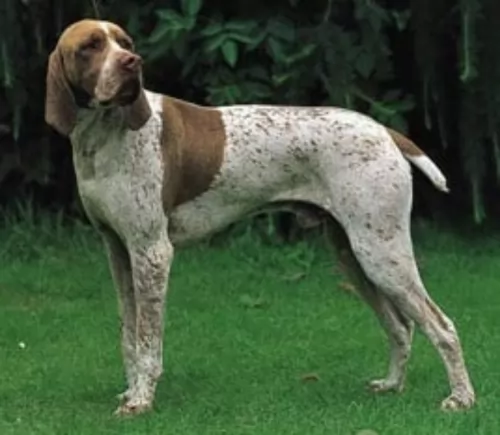 The attractive Braque Francais is a calm, contented dog who is also affectionate, social and intelligent. He is already a well mannered dog but will do even better with training and socialization. However, Braque Francais don’t take well to aggressive training and done the wrong way, the dog can end up being timid and confused.
The attractive Braque Francais is a calm, contented dog who is also affectionate, social and intelligent. He is already a well mannered dog but will do even better with training and socialization. However, Braque Francais don’t take well to aggressive training and done the wrong way, the dog can end up being timid and confused.
Wanting to please and being an intelligent dog, training should be fun, lighthearted but firm. In exchange you’re going to have an awesome friend from this wonderful, loving dog breed.
 Your Puli is a self-confident, strong willed dog that is intelligent and can learn to be obedient and well mannered. They are also social and playful, and will love to be a family pet, being prepared to provide friendship and loyalty.
Your Puli is a self-confident, strong willed dog that is intelligent and can learn to be obedient and well mannered. They are also social and playful, and will love to be a family pet, being prepared to provide friendship and loyalty.
Because he has always been a herding dog, he takes his role of guardian and protector of his human family seriously. He makes a splendid pet if you’re ready to tackle the long coat which makes sure he doesn’t fit into the low-maintenance category.
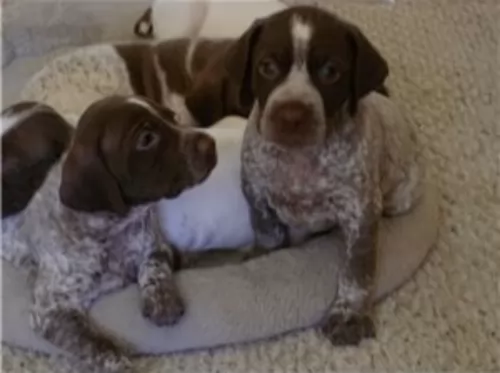 You won’t find many health issues with this active breed but nonetheless hip and joint issues will need to be watched. If you are considering a Braque Français puppy, you’ll want to be selective in choosing a responsible breeder. A healthy puppy with the right environment, can get to up to 15 years of age.
You won’t find many health issues with this active breed but nonetheless hip and joint issues will need to be watched. If you are considering a Braque Français puppy, you’ll want to be selective in choosing a responsible breeder. A healthy puppy with the right environment, can get to up to 15 years of age.
Ectropion and entropion in dogs affect their eyelids. Ectropion is where the eyelids roll outward, whereas entropion is where the eyelids curve inward, irritating the eye. Because visual and skeletal problems occur in this breed, it can be recommended that owners have their pets tested by both the Canine Eye Registration Foundation as well as the Orthopedic Foundation for Animals.
 Joints, eyes, and skin problems can cause problems with the Puli dog. Hip dysplasia is a problem with many dogs that can cause pain and also lameness.
Joints, eyes, and skin problems can cause problems with the Puli dog. Hip dysplasia is a problem with many dogs that can cause pain and also lameness.
Check your pet over with grooming sessions and make sure both the ears and eyes are free of discharge and redness.
The coat is thick and the Puli will require you to watch his skin for bacterial infections which can be caused by a lot of itching and scratching. Other common canine health issues to look out for are cancer and bloat.
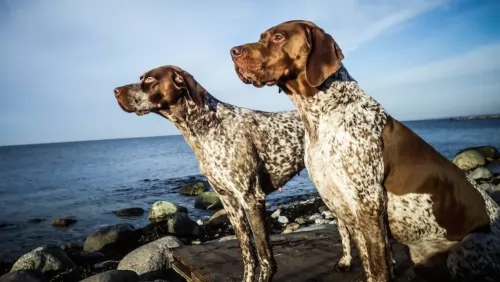 Brushing the coat twice a week will get rid of loose hairs and maintain the sheen of the coat. Also, as a floppy eared breed, attention should be given to the ears to prevent infections. He will also need to have his teeth brushed with dog toothpaste and brush to prevent the build-up of damaging plaque and his nails will also require a clipping if they don’t manage to wear down naturally.
Brushing the coat twice a week will get rid of loose hairs and maintain the sheen of the coat. Also, as a floppy eared breed, attention should be given to the ears to prevent infections. He will also need to have his teeth brushed with dog toothpaste and brush to prevent the build-up of damaging plaque and his nails will also require a clipping if they don’t manage to wear down naturally.
Daily activity will be needed for this dog and he will want a walk every day. He certainly isn’t a dog you can leave indoors or outside in your backyard day after day. Any activities that require physical exertion will be good because they are exceptional athletes. If you are a cyclist or a runner, take him with you – he’ll love it.
Your Braque Francais loves energetic activities and for this he will require an excellent nutrient-rich diet. Nutrient-rich dog foods are higher in protein and fat and lower in carbohydrates. It’s important to check out the carbohydrate content in commercial dog foods to avoid those one high in carbohydrates.
Your vet can always advise you on a good quality food and you can always give him your own home-prepared foods which include rice, vegetables and meat. Certainly include some raw meat into his diet every now and then to avoid skin problems. Fresh, cool water must be available to him night and day.
 Training and socialization is important for any dog and not just the Puli. Well trained dogs are a joy to have around – they are obedient and well mannered. The Puli is intelligent enough for you to train him yourself or you can have a professional trainer do it for you.
Training and socialization is important for any dog and not just the Puli. Well trained dogs are a joy to have around – they are obedient and well mannered. The Puli is intelligent enough for you to train him yourself or you can have a professional trainer do it for you.
The Puli is an athletic dog but you don’t want to start with any strenuous exercise with a young dog less than a year of age. Take your young dog for walks and give him some ball games. Only start more strenuous exercise later on to spare unnecessary pressure on the joints which could lead to hip dysplasia later on.
Every dog needs to be brushed and groomed to ensure its health. A dog like the Puli will need additional grooming because of the long dreadlocks for a coat. Many Puli owners prefer to have the hair cut short.
The coat of the Puli luckily doesn’t shed much but the coat, if you keep it long, will require a special wide tooth comb. You’ll need to check inside his ears, check that his eyes are bright without any discharge and also trim his nails.
You will have to check inside his mouth too. He can’t tell you if he has a rotten tooth that is painful and causing him to be sick. You need to regularly check his teeth.
It is important to know how much to feed your Puli. A healthy diet is so important for good health and a long life. All dogs have different appetites depending on their age, their breed, their size, the season of life they’re in and their activity levels.
It is better to feed your dog twice a day as opposed to one meal a day to avoid life threatening illnesses such as bloat. There are excellent commercially manufactured dog foods, but also bad ones, so you want to make sure that the kibble you choose is a high quality one with lots of vitamins and minerals.
You want to give him some home-made food too, keeping it simple and uncomplicated – the way dogs like it. Boiled chicken, brown rice or pasta and spinach, sweet potatoes and carrots are a healthy choice for your pet.
Chop it up and add it into the dry kibble a couple of times a week. Some raw meat added in from time to time will contribute to him being healthy. Never leave him without a constant source of fresh, cool water.